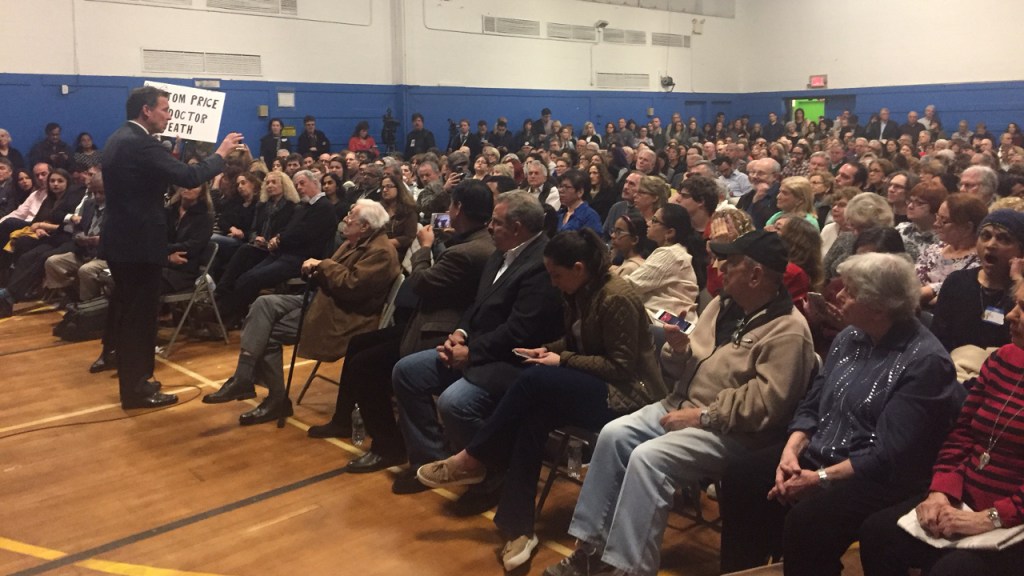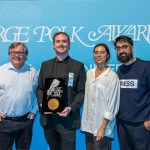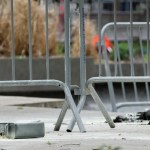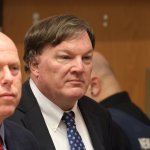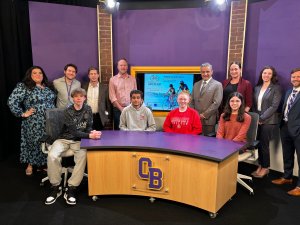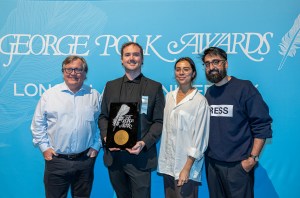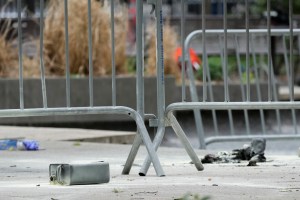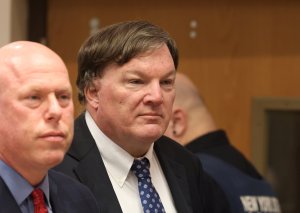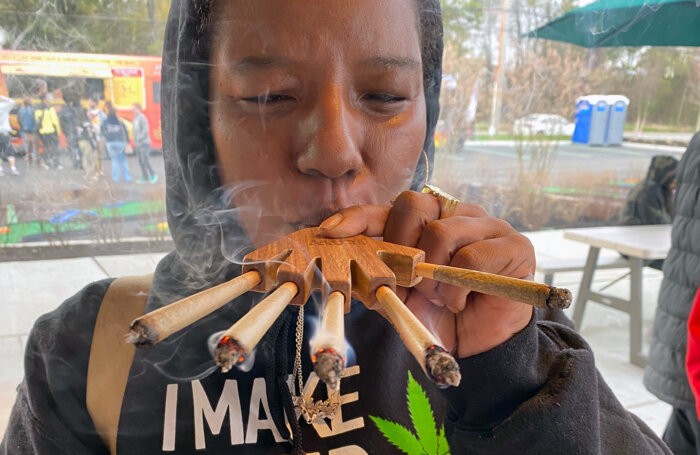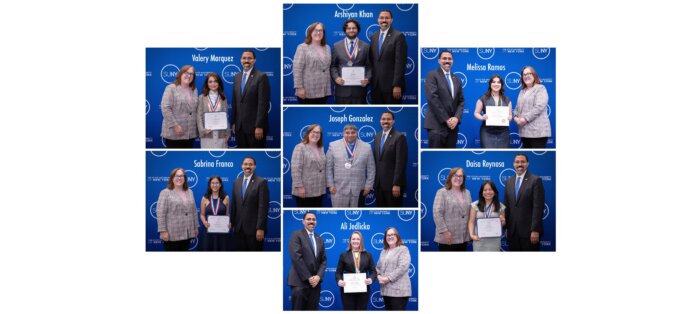For over three hours, freshman Congressman Tom Suozzi took questions from an overwhelmingly supportive crowd gathered at the Mid-Island Y JCC in Plainview for his first town hall event since his taking office in January. The participants ranged from a 98-year-old former Congressman to an 89-year-old refugee who fled Hitler and a seven-year-old who thought the new president is “very bad.”
In the auditorium, it was standing room only as Suozzi set the ground rules for the evening. “I want to make it clear—this is not going to be a Trump rally, so nobody gets to lose their temper and punch somebody if they disagree with them!” He wanted “respectful behavior” and said that all comments should be directed only at him because “I can take it.”
To keep the evening moving, Suozzi suggested they tackle four issues, starting with saving the Affordable Care Act (Obamacare), the “unusual relationship between the president of the United States and Putin,” the “discriminatory” anti-Muslim travel ban and the deportation of undocumented immigrants that is “destroying neighborhoods.” Then, responding to audience suggestions, he added the environment as well as preserving Medicaid and Social Security.
He even polled the crowd about how long they wanted the town hall to last—9:30 p.m. seemed to win the majority vote but Suozzi was still fielding questions from about a dozen constituents after 10 p.m. while the custodians packed up the chairs to clear out the auditorium.
Suozzi’s approach to meeting his constituents was quite different from the one taken by second-term Rep. Lee Zeldin (R-Shirley), who held an hour-long teleconference from an undisclosed location on the East End. Across the country Republican Representatives who’ve dared to hold town halls during this recess have taken heat from constituents upset at the direction Congress and the White House are going.
Zeldin reportedly took about a dozen questions, touching on Obamacare, gun control, Trump’s conflicts of interest and the rise of anti-Semitism. A caller identified as Joe asked him: “As an American and as a Jew, how do you condone Donald Trump’s belated condemnation of the rise of anti-Semitism that has been going on throughout his campaign and now his presidency?”
Zeldin, who is Jewish, said he was critical of the president for not mentioning the plight of Jews in the administration’s recent Holocaust Remembrance Day statement.
“It’s important that our statements reflect and honor and never forget the loss of millions of other people who weren’t Jewish,” he said. “I also believe it’s very important to mention the fact that Adolf Hitler and the Nazis were trying to exterminate the entire Jewish religion.”
Zeldin also condemned the bomb threats against Jewish community centers across the country and the desecration of the Jewish cemetery near St. Louis. Then the same caller asked the Congressman why President Trump hadn’t visited the mosque in Texas that was firebombed on Jan. 28.
“Morally it’s the right thing to do to speak out when there is intimidation, physical threats, violence, destruction of personal property—sacred personal property—speaking out at those moments is a leadership opportunity,” Zeldin replied. “Not only to connect with the people who support you, but many others who maybe didn’t vote for you.”
In Plainview, the public’s outrage over President Trump’s policy pronouncements was palpable from the moment they sat down, waving anti-Trump signs, American flags, and little placards that read “Agree.” Early on, Suozzi asked the audience to raise their hands if they were Trump supporters—only one woman raised hers. Some participants were part of progressive groups like MoveOn and Indivisible, and they’d come from Queens, Nassau and Suffolk to hear him.
“We have to hold the president accountable,” said Suozzi. “Things are a little scary right now.” Indeed, Suozzi praised the Mid-Island Y JCC for holding the public event in light of the nation’s Jewish centers targeted with bomb threats—“67” so far, said a lady from her seat.
At several times during the evening, the town hall took on the air of a political pep rally, as Suozzi repeatedly urged the audience to go out and organize, which many Long Islanders have already done.
In particular he wanted their support for what he called “New York’s Third Will Be Heard,” a volunteer action campaign drawing upon 16 neighborhood regions of the 3rd Congressional District, as shown by two billboard-size maps on display at the front of the stage. The purpose, he said, is to “take all this energy that we’ve got, all this excitement that we’ve got, and use it in a constructive fashion to do the politics to win the battles. That means writing letters to the editor, attending issues meetings, that means going to other town hall meetings, that means running for office, that means supporting people for local office, because one of the reasons the country’s ended up the way it is right now is because the Democrats have not done a good enough job organizing locally throughout this country.”
He vowed to keep on pushing and fighting to get answers to the questions facing the nation as Trump settles into power.
“We can’t hate the Trump supporters,” he said. “The reality is that many of them are in desperate conditions as well. They don’t realize what they’ve gotten themselves into.”
He urged the activists in the audience not to underestimate their influence, referring to the Congressional Republicans’ inability to eliminate Obamacare without coming up with a valid replacement and the courts’ decision delaying Trump’s travel ban after nationwide protests sprung up against it.
In response to a questioner’s concern that Russia meddled with the November election, Suozzi said it’s time for “reasonable Americans” to put the love for their country before their party and help get bipartisan support to find out what’s going on between Putin and Trump. “If you care about your country, you want to know the answer to this question,” Suozzi said. Since the McCarthy era, he noted that the Republicans have tried to paint the Democrats as “the unpatriotic ones and the Republicans as the patriotic ones, which is not true at all!”
Suozzi admitted he has drawn some heat himself—even from his own political advisers—for joining a new bipartisan group of Congressmen called “the Problem Solvers Caucus,” consisting of 20 Democrats and 20 Republicans. He said working across the aisle to find common ground is going to be key in the coming years considering that the GOP controls the White House and Congress.
“Right now Chuck Schumer is probably the most powerful Democrat in the United States of America because he’s the bulwark” of the opposition against the conservatives’ agenda, Suozzi said, referring to New York’s senior U.S. Senator.
Perhaps the most combative moment came when a young man near the back of the auditorium demanded that Suozzi proclaim his support for Rep. Keith Ellison of Minnesota to be the next chairman of the Democratic National Committee, which will vote on Saturday in Atlanta. Suozzi refused, but he wouldn’t say who he preferred, either. “I don’t want to get into DNC politics,” he said. The contest seems to come down to Ellison, a liberal Muslim-American, and Thomas Perez, who was the secretary of Labor in the Obama administration. The majority of the audience at the JCC seemed eager to move on to other matters.
“This is so powerful that you are in this room and that there are so many of you like this in places like this all over the country!” Suozzi exclaimed. “Don’t blow it by fighting against ourselves!” That response drew loud support from the audience.
Among those on hand who weighed in on Obamacare were several cancer survivors and their spouses who made a passionate pitch for keeping the program in some form. One man whose wife has a pre-existing condition said that “we need to amend it, not end it.” Suozzi said he prefers single payer but “the problem is that the insurance companies and the pharmaceutical companies have much too much influence” in health care policy, which makes it harder to fix.
Health care was the top topic at Zeldin’s teleconference, according to his staff who conducted a survey of those on the line. The Shirley Congressman said, “No one wants to pull the rug out from anyone who is currently covered. That is an important focus of mine.” He noted that his fellow New York Republican Representatives are working to “mitigate” the effects of an “outright repeal” because the state would stand to lose billions of dollars in Medicaid. Nor does Zeldin support measures that would weaken Social Security or Medicare.
Addressing his Nassau audience’s concerns about health care, gun violence and climate change, Suozzi said the main stumbling block always boiled down to money “because if you’re not paying attention, money will always control the conversation.”
Occasionally, when someone would ask Suozzi about a certain bill, he had to admit he’d only been in office “50 days.” He conceded that he and his staff were feeling “overwhelmed” trying to deal with the myriad of important issues all pressing for their attention, and he’s had “very little free time.” But he promised he would get up to speed on the particulars. In Congress he’s serving on the foreign affairs and the armed services committees.
Seated in the front row across from Suozzi’s wife Helene was former Congressman Lester Wolff, 98, a Great Neck Democrat, who smiled broadly when Suozzi introduced him. Two hours later when he got up to leave, Suozzi gave him the microphone. Wolff said he was very happy to see that the seat he’d held on Long Island from 1964 to 1981 was in “good hands right now.”
On the immigration issue, Anu Raj, who was born in India near New Delhi, told Suozzi that too many Americans today misunderstand what extreme vetting is. Now a citizen, she came to the country when she was 15 years old and told the JCC audience about what she went through two decades ago to enter the United States. “I was put through the ringer,” she said, and she had a green card. At one point at JFK Airport, she felt that she’d been hung upside down. It was a grueling process then, and it’s only gotten stricter, as Suozzi observed. He noticed that she was with her husband and her twin daughters, both born in the U.S., and he posed with them, sparking a round of selfies with the crowd.
“One of the reasons that New York is much more understanding of immigrants and why the Muslim ban is a problem is because we’re surrounded by immigrants and Muslims!” Suozzi said. “If you go out to some places in the country where there are no immigrants and no Muslims, it’s like: ‘Get those people out of here!’ We’ve got a lot of work to do to educate people.”
He pledged to fight for tolerance. “We can’t give up who we are,” he said. “This ban not only makes us less safe—it’s not who we are; it’s not who the United States of America is.”
He recalled how his own father left Italy to come to America as a very young boy. “America is founded on two very fundamental principles,” he said. “All men and women are created equal. It’s not all men and women with green cards are created equal.”
Wearing an Army baseball cap and seated in the front row was Harry Arlin, 89, who was born in Czechoslovakia. “I had the privilege of living briefly under Hitler and I had to run,” said Arlin. “Then I lived under Mussolini and I was incarcerated. Then I lived briefly under Stalin, and I had to run again. Now I’m living briefly under Trump. I’m too old to run again!” The crowd roared with appreciation.
Despite all that’s been going on in Washington—as well as recounting his personal history (“I’ve won a lot and lost a few”)—Suozzi insisted that he believed politics was a noble profession—and he urged people to stay involved.
“You know, John Kennedy used to describe himself as an idealist without illusion,” the Congressman said. “I’m not a sucker. I’m not going to fall for stuff. But I still believe in the country. I still believe in this system. I believe this is a powerful group of people that can make change. The sooner you give up on that, the sooner this country is wrecked.”
Seven-year-old Zachary Aquino, a second grader at Floral Park JLC Elementary School, had to stand on his chair to make his point. Confidently taking the microphone, the youngster said, “I don’t think this is right. Having this president I think is really bad. I don’t know how this happened…It’s good that we’re here tonight. This is a really valuable time that we’ve got to get this stopped. We’ve got to do this. We cannot stop! My name is Zachary.”
“Thank you, Zachary!” said Suozzi, with a smile.



